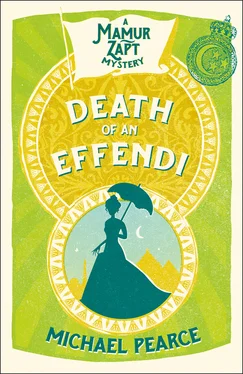Mahmoud climbed into one of the punt-like boats and two of the boatmen prepared to paddle him over. He asked Owen to go with him.
The men had been on the shoot itself, in the boats where the bulk of the party had been stationed, in the open water beyond the headland, just at the edge of the reeds, where the reeds would conceal them. They were describing to Mahmoud what had happened, putting their arms up to mimic the shooting.
It hardly seemed possible it could be the same place. Then the air had been torn by shooting, there had been a kind of tension. Now everything seemed incredibly peaceful. Ducks were dawdling in and out of the reeds, hardly bothering to register their presence. The sun was warm on the woodwork, the blue lake sparkled in the sun, as still as a mirror. He found it hard to reconcile with his memory.
‘Of course,’ he said to Mahmoud, ‘we weren’t out there. We were in there.’
He pointed vaguely towards the reeds.
‘We?’ said Mahmoud.
‘Tvardovsky and I. In two separate boats.’
‘Just the two of you?’
‘Yes.’
‘Why was that?’
‘We had different boats. They could go in among the reeds.’
‘How did you come to have different boats?’
Owen shrugged.
‘Accident. Maybe we arrived later than the others. The other boats were all taken.’
Mahmoud took the boat over to the reeds and peered in. They were impenetrable to a boat like his.
‘How would you see to shoot?’ he asked.
‘You would be shooting upwards. You would see the birds against the sky.’ He tried to remember. ‘You wouldn’t have long. Of course,’ he added, ‘Tvardovsky wasn’t shooting.’
Mahmoud sat there for some time thinking. Then he told the boatmen to take the boat back to the land. There Owen saw him talking to the man who had been Tvardovsky’s boatman.
He came back towards Owen.
‘You were in a separate boat,’ he said. ‘Where is your boatman?’
Owen looked around and couldn’t see him.
Mahmoud spoke to some of the men.
‘He’s gone to visit his mother,’ he said.
The boats had finished emptying their catch now. The nets had been spread out along the bank. There was a stink of fish in the air. Some of the men had gone to sit in the shade of a large boat that had been drawn up out of the water. Mahmoud stayed talking to them for some time.
Owen wandered along the bank. He came to a small bay where flamingoes were paddling on the lake. Beside them was a pair of pelicans. As Owen watched, one of the pelicans stooped down into the water and came up with a fish. Owen saw its tail disappearing into the bird’s beak as it was swallowed. It was a large fish and made a bulge in the pelican’s neck. With horrified fascination Owen watched the bulge wriggling as it went down.
The Mudir was sitting under a palm tree chatting to some waiters. Mahmoud went across to greet him and then brought him back to a table on the terrace, where he summoned coffee. The Mudir sat down uneasily. While a Parquet officer did not count as the great, the Parquet itself was a mysterious object over the horizon from which from time to time incomprehensible reproofs would come like a bolt from the blue.
‘The man was dead,’ he said, shifting uncomfortably in his seat. ‘What need of a postmortem?’
‘To establish the cause of death.’
‘He was shot. There is no puzzle about that.’
‘Yes, but—’
‘And, besides, he was a foreign effendi.’
‘So?’
The Mudir shrugged.
‘You don’t mess about with foreign effendis,’ he said, ‘even when they’re dead.’
‘You have a responsibility,’ said Mahmoud sternly, ‘to establish how he died.’
‘I know how he died! He was shot. There!’ The Mudir clapped his chest dramatically.
‘At what range?’
‘What range?’
‘How far away was the person who fired the shot?’
‘Well, hell, I don’t know. It was among the reeds and—’
‘The postmortem might be able to tell you that.’
‘But can’t we guess? The shot must have been fired from one of the boats and—’
‘The boats were scattered. I know, because I asked the boatmen. If we knew the range, it might help us to establish which boat.’
‘Anyway,’ said the Mudir lamely, ‘there was no ice.’
‘Ice? What’s that got to do with it?’
‘To pack the body in. If we wanted to preserve it for a postmortem. It’s very hot at this time of year and—’
‘But there was plenty of ice! The hotel had lots of it.’
‘Ah, yes, but that was ice for putting in drinks. You couldn’t use that. Not for a foreign effendi. It would be disrespectful.’
‘So what did you do with the body?’
‘I let the effendis have it.’
‘You what ?’
‘I let the effendis take it away. They said they would see to all that was necessary. And I said to myself, yes, surely that would be best, for they will know what is proper. Who am I to say what rites should be used for a foreign effendi? You can’t expect a Mudir to know everything.’
‘You let them take it away? Just like that? Without even getting a doctor to sign a death certificate? Have you no notion of procedure, man?’
‘It wasn’t like that,’ protested the Mudir, stung. ‘These were foreign effendis, great and mighty. And, besides, Prince Fuad said if I didn’t get a move on, he would kick my arse.’
‘There is a procedure to be followed,’ lectured Mahmoud, ‘and you, the Mudir, should be seeing that it is followed. No one is above the law. Neither foreign effendis nor Prince Fuad.’
‘You try telling Prince Fuad that!’ said the Mudir.
The tables on the terrace were filling up now for lunch. White tablecloths gleamed, silver serviette rings shone. Ice buckets smoked, ice chinked in glasses. Mahmoud had gone into the hotel to see if he could obtain a list of the people who had been there on the weekend when Tvardovsky was shot. Owen was reading the wine list.
A man came out on to the terrace. He stopped when he saw Owen and then came across to him.
‘Why, Captain Owen,’ he said, ‘what brings you here? Taking a break? Oh, no,’ he smiled, ‘I was forgetting: you will be here on business. This sad Tvardovsky affair!’
Owen did not recognize him.
‘Mirza es-Rahel,’ said the man helpfully. ‘I work for Al-Liwa .’
‘I know your writing, of course,’ said Owen, ‘but the face—’
They shook hands. It was true. He did know his writings. And very scurrilous they were, too. The man seemed to have a knack of unearthing scandalous stories about the royal family and the politicians with whom the Khedive surrounded himself. But the face was unfamiliar.
Which was surprising, for Owen thought he knew most of the important Nationalist journalists who worked in the city.
‘I’m based in Alexandria,’ the Egyptian explained.
That, too, was surprising: for it was Cairo that was the hub of government, the place where the Khedive and his ministers resided, and where one would naturally expect to find journalists of Mr es-Rahel’s ilk. He said as much.
‘But it is Alexandria where the money is,’ said the Egyptian, smiling again, ‘and I have always found the financial connection the most promising of threads to pursue.’
‘Not sex?’
‘That, too,’ Mr es-Rahel conceded. ‘But sex is for pleasure: money is something you take seriously.’ He laughed. ‘Or, at least, the Pashas who rule us do.’
‘And which is it that brings you here, Mr es-Rahel? Business or pleasure?’
‘Pleasure. Though not, I’m afraid, of the sexual kind. Merely taking a break. I was feeling a bit jaded. Alexandria, you know, fills up at this time of year with holiday-makers. I felt a day or two in the quiet by the lake would do me good.’ He looked across to the main building and saw Mahmoud coming out of a door. ‘You are here with Mr El-Zaki?’
Читать дальше












